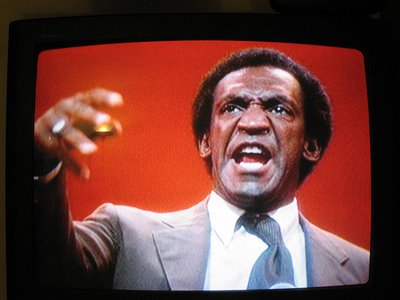Bill Cosby has more to say
 Bill Cosby is upset again. This time at the Washington Post for a series they're doing entitled "Being a Black Man", which includes video clips from young Black men, saying that it paints too rosy a picture of young Black men in America. He asserts, "The Washington Post ran a clip and then they edited it and they had in what they wanted us to see these men saying... unless I missed it, I heard not one black man say anything about being a father. I heard not one black man say, 'my responsibility,' not one. The edited version of these people with a camera on a drive-by – I'm looking to media. I don't like people who see and can't tell the truth. . . . A man tells me, 'It's not as bad as it seems.' I don't want to hear that shit." Bill Cosby was the lead speaker on a recent panel entitled, "Paths to Success: A Forum on Young African American Men", and was speaking about several surveys and points that were given in the Washington Post series including their findings that eight in 10 black men surveyed said they were satisfied with their lives and six in 10 reported that it was a "good time" to be a black man in the United States. Bill Cosby prompted a lot of dialogue a year or so ago when he lambasted working class Blacks for their child rearing and values.
Bill Cosby is upset again. This time at the Washington Post for a series they're doing entitled "Being a Black Man", which includes video clips from young Black men, saying that it paints too rosy a picture of young Black men in America. He asserts, "The Washington Post ran a clip and then they edited it and they had in what they wanted us to see these men saying... unless I missed it, I heard not one black man say anything about being a father. I heard not one black man say, 'my responsibility,' not one. The edited version of these people with a camera on a drive-by – I'm looking to media. I don't like people who see and can't tell the truth. . . . A man tells me, 'It's not as bad as it seems.' I don't want to hear that shit." Bill Cosby was the lead speaker on a recent panel entitled, "Paths to Success: A Forum on Young African American Men", and was speaking about several surveys and points that were given in the Washington Post series including their findings that eight in 10 black men surveyed said they were satisfied with their lives and six in 10 reported that it was a "good time" to be a black man in the United States. Bill Cosby prompted a lot of dialogue a year or so ago when he lambasted working class Blacks for their child rearing and values. Now, I have always loved Bill Cosby. I think he is an important figure in American culture, American history and Black history. But I feel myself torn with his words. The "picture perfect" American dad is now replaced with a more human side, more imperfect side; something that is disconcerting when you hold someone, especially a celebrity, up on such a high pedestal. That's why making celebrities role models is such a dangerous proposition. The celebrity is a product of a larger star system that crafts that person into an ideal. That person will inevitably act out against or deviate from the ideal. Bill Cosby is an example of that. While I understand his frustration at the state of Black people in America, I do not condone his harangue against them, particularly working class Blacks. Cosby's comments are particularly interesting as they show the disconnect between working class and middle class Blacks.
So what is the answer? While I do agree with Cosby in his assertion that things aren't great for Black men in the United States (or Black people for that matter) what good will admonishing people do? What steps, programs, mentorships, allocations of Black money, representation in government, movements, etc. in Black communtities need to be made so that Black children and Black people will have a better quality of life in America? I am still a fan of Cosby, that will never change. But now I realize that he is human.
*If you have some time today, please check out the following articles from Slate and the New York Times . They are both fascinating reads and will definitely give you a lot to talk about*.
tmesis -- n: In grammar and rhetoric, the separation of the parts of a compound word, now generally done for humorous effect; for example, "what place soever" instead of "whatsoever place," or "abso-bloody-lutely."
"I realize that if I wait until I am no longer afraid to act, write, speak, be, I'll be sending messages on a Ouija board, cryptic complaints from the other side" -- Audre Lorde


1 Comments:
Hello Spelman Sister,
Did you get a chance to read the chats on the same series in the Washington Post? John McWhorter and Michael Eric Dyson have both participated. Take a look.
What did you think about BroCos at the graduation?
Enregistrer un commentaire
<< Home